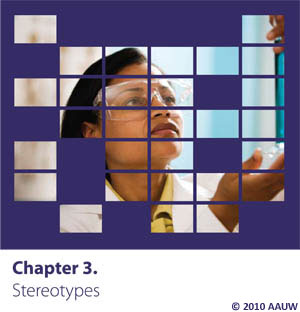

- Encourage students to have a more flexible or growth mindset about intelligence.
- Expose girls to successful female role models in math and science.
- Teach students and teachers about stereotype threat.

Stereotype Threat: Easily Triggered and (Fairly) Easily Lifted
More than 300 studies have been published documenting the existence and effects of stereotype threat. These experiments show that stereotype threat is often the default situation in testing environments. The threat can be easily induced simply by asking students to indicate their gender before a test or having a larger ratio of men to women in a testing situation. Research consistently finds that stereotype threat adversely affects women's math performance and may account for as many as 20 points on the math portion of the SAT (SAT-M). While 20 points on a test with a total possible score of 800 may seem insignificant, keep in mind that in 2010 the average male score on the SAT math exam was 34 points higher than the average female score - so eliminating stereotype threat could eliminate nearly 60 percent of the gender gap on the SAT-M. Fortunately, because stereotype threat is triggered by the test-taking environment, it can also be fairly easily alleviated by changing the environment. In Why So Few? Women in Science, Technology, Engineering, and Mathematics, we recommend some steps to reduce the harmful effects of stereotype threat: Interventions designed to help students adopt a malleable mindset about intelligence and thus reduce their vulnerability to stereotype threat positively affect their academic performance. Exposing girls to successful female role models can help counter negative stereotypes because girls see that people like them can be successful and that stereotype threat can be managed and overcome. Research shows that acknowledging and explicitly teaching college students about stereotype threat can result in better performance. Teachers and college faculty are best suited to do this and therefore need to know about stereotype threat themselves. Have you ever taught students about stereotype threat? If so, how was it received? Did you get the sense that it made a difference?

Christi,
Thank you for the link! Very interesting article.
Marian
Hi Marian for Math,
Here is a link to one study - "Knowing is Half the Battle: Teaching Stereotype Threat as a Means of Improving Women's Math Performance" by Michael Johns et al. - that shows that the effects of stereotype threat can be alleviated by teaching young women about it - http://clint.sharedwing.net/2print/knowing.pdf
Best,
Christi
Laura,
Bad on me for not noting the poster. Thanks for pointing it out.
I'd still be curious about the results of teaching the stereotype threat.
Marian
Hi Marian for Math,
This posting is from Christi Corbett, coauthor of AAUW's terrific study of women in science released last year, who shares the forum with me. But yes, there have been some very good studies of how teaching about stereotype threat can detoxify its effects. I will look up a reference or two and post them on this thread in case you want to check them out. I know you have an active interest in working with young women considering science.
best,
Laura
Laura,
You are spot-on with your suggestion of role models. The first woman math, physics, or engineering teacher I had was in graduate school. She was a "lecturer", hired primarily because her husband was on the university faculty. Since she was about 10 years older than I, we had a lot of discussions about barriers she (and I) had experienced.
Girls need to learn that women can succeed in STEM fields. And, that while doing so we can still be "normal", meaning have husbands, families, and a life.
You suggestion about teaching the stereotype threat is also a good one. I'd be interested to hear if anyone has tried it and with what results.
Marian
















